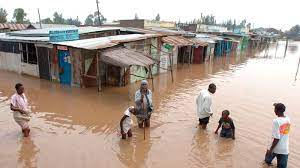As additional remains are found, the death toll from floods and landslides in the eastern Democratic Republic of the Congo has increased to 203, a government official announced on Saturday.
At least 176 people were confirmed killed as of late on Friday (May 5), according to the province governor.
According to Thomas Bakenga, administrator of Kalehe territory, where the damaged villages are situated, "here in Bushushu, 203 bodies have already been removed from the rubble."
He informed the local media that it was impossible to determine the entire scope of the material losses and human losses.
Thursday's heavy rains in the South Kivu province's Kalehe district led to rivers overflowing and landslides that swallowed the communities of Bushushu and Nyamukubi.
In Nyamukubi, where the weekly market was conducted on Thursday, the slope also collapsed, Bakenga continued.
In all, when rivers in the area burst their banks owing to the severe rains, numerous villages were drowned, many buildings were washed away, and farms were damaged.
Denis Mukwege, a Congolese physician and recipient of the Nobel Peace Prize, announced on Saturday that he had dispatched a team of surgeons, anesthetists, and technicians to the region in order to "provide the population with emergency medical aid." Bukavu is the capital of South Kivu.
The catastrophe occurred two days after floods in the neighboring country of Rwanda killed at least 131 people and wrecked thousands of houses.
On Saturday, UN Secretary-General Antonio Guterres sent his sympathies to the people who had been affected by the "catastrophic floods" in Rwanda and the DR Congo.
During a visit to Burundi, he declared, "This is yet another illustration of accelerating climate change and its disastrous impact on countries that have done nothing to contribute to global warming."
According to experts, climate change is causing an increase in the frequency and severity of extreme weather occurrences.










.jpg)